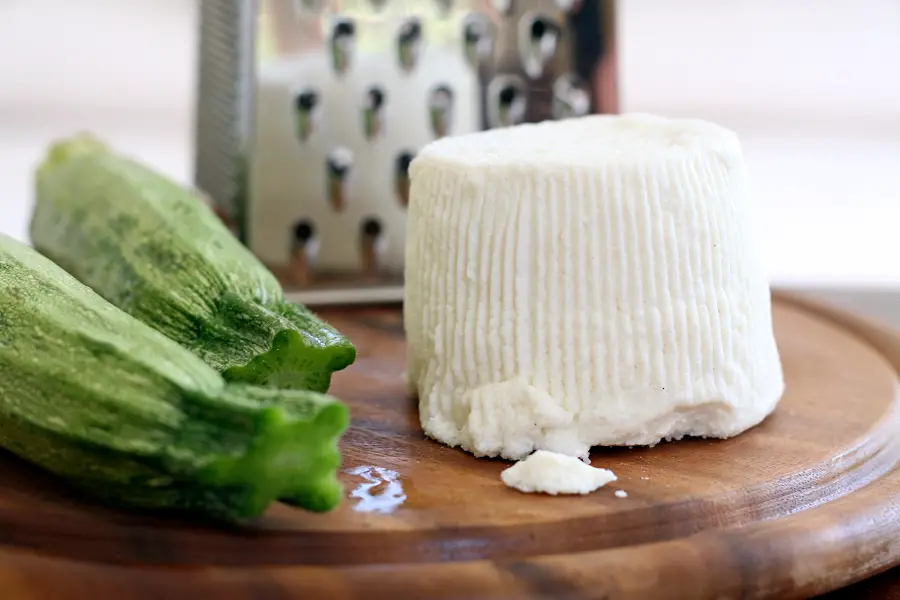Since ricotta and cottage cheese are often compared, we decided to do an article on ricotta vs cottage cheese. In recipes, they’re often substituted for each other. The most popular switch is in lasagna where there are many layers and flavors that make it difficult to detect a taste difference with substitution. In most recipes (including lasagna), the substitution measurement is a cup for cup. So if the recipe calls for a cup of ricotta, you could substitute a cup of cottage cheese. While many people believe ricotta and cottage cheese taste similar, there are some differences in the manufacturing processes and nutrition.
How They Are Made
Cottage cheese is made from milk (usually cow’s) which been coagulated to form curds. Coagulation happens when a starter like rennet is added to heated milk. As the curds form, the whey (yellowish liquid) separates from the curd. The whey liquid is mostly drained away leaving the curds that are typically rinsed and then mixed with cream, buttermilk, etc., to create that classic cottage cheese taste. Cottage cheese is made with different milkfat percentages: fat-free, 1 percent, 2 percent, and 4 percent (creamed). The nutrition of cottage cheese varies based on the milkfat percentage used.
Ricotta cheese is traditionally produced from the leftover whey from making other cheeses like mozzarella. The whey is collected and left to sit out to ferment for about a day. It is then heated until a curd is formed and then placed in a cheese cloth for final formation. Alternatively, to letting the whey ferment, an acid like vinegar or lemon can be added to spark the curdling process when heated. Additionally, modern techniques usually replace the whey with part skim or whole milk.
Flavor
Cottage cheese is milky, creamy, with a moderate saltiness to it. It is also sometimes tart depending on the brand or product. Ricotta cheese is often described as being sweet and creamy. The texture of cottage cheese is chunky from the curds with a moderate wetness from the added cream/milk. Ricotta is routinely much smoother but had an often grainy texture.
Nutrition
The biggest difference between ricotta vs cottage cheese is in their nutrition as you will see below. Cottage cheese is far better for you nutritionally than ricotta. You will notice a huge difference in the calories and fat content. For example, full-fat or creamed cottage cheese has 220 calories, while whole milk ricotta has a whopping 428 calories. If you are looking to save some calories, it is worth considering substituting out ricotta for cottage cheese where appropriate. However, cottage cheese is loaded with sodium compared to ricotta cheese. Ricotta cheese may be the better option if you are concerned about your daily sodium intake.
Ricotta Cheese Nutrition Facts
| Ricotta Cheese Type | Serving Size | Calories | Total Fat | Saturated Fat | Cholesterol | Sodium | Carbohydrates | Dietary Fiber | Sugars | Protein | Calcium |
|---|---|---|---|---|---|---|---|---|---|---|---|
| Whole Milk | 1 Cup | 428 | 32 g | 20 g | 125 mg | 207 mg | 7.5 g | 0 g | 0.66 g | 28 g | 509 mg |
| Part Skim Milk | 1 Cup | 339 | 19.5 g | 12 g | 76 mg | 244 mg | 12.6 g | 0 g | .76 g | 28 g | 669 mg |
Cottage Cheese Nutrition Facts
| Cottage Cheese Type | Serving Size | Calories | Total Fat | Saturated Fat | Cholesterol | Sodium | Carbohydrates | Dietary Fiber | Sugars | Protein | Calcium |
|---|---|---|---|---|---|---|---|---|---|---|---|
| Nonfat, uncreamed, dry, large or small curd | 1 cup (not packed) | 104 | .42 g | .245 g | 4 mg | 539 mg | 9.66 g | 0 g | 2.68 g | 15 g | 125 mg |
| Low-fat 1% | 1 cup (not packed) | 163 | 2.31 g | 1.45 g | 9 mg | 918 mg | 6.15 g | 0 g | 6.15 g | 28 g | 138 mg |
| Low-fat 2% | 1 cup (not packed) | 183 | 5.13 g | 2.79 g | 27 mg | 696 mg | 10.76 g | 0 g | 9.04 g | 23.62 g | 251 mg |
| Creamed (Large Curd) | 1 cup (not packed) | 206 | 9.03 g | 3.6 g | 36 mg | 764 mg | 7.10 g | 0 g | 5.61 g | 23.35 g | 174 mg |
| Creamed (Small Curd) | 1 cup (not packed) | 220 | 9.68 g | 3.9 g | 38 mg | 819 mg | 7.60 g | 0 g | 6 g | 25.02 g | 187 mg |


Very helpful!
Thanks for reading!
Thanks, Marilyn! We are glad the article helped you.
Almost all cottage cheese is low fat so it is hard to find a calorie comparison between the two that is fair. In my early days in the 1970s, as a granola mom, I made our own cheeses. We loved whole milk cottage cheese made with raw milk from the local dairy. Commercial low fat is nothing like that. In fact, none of my family really like store bought cottage cheese for that reason. I actually prefer the taste and texture of ricotta.
Nutritionally, I really don’t see a huge difference except for Fat and Calories. Why are Americans so hell-bent on making those factors THE basis of good, healthy foods? Protein, Calcium, and Sodium are as important, or more. I eat Ricotta with blueberries and it’s delicious and my cholesterol is perfect, a is my weight, and all other vitals. And, I’m American/Italian(100%). Disagree.